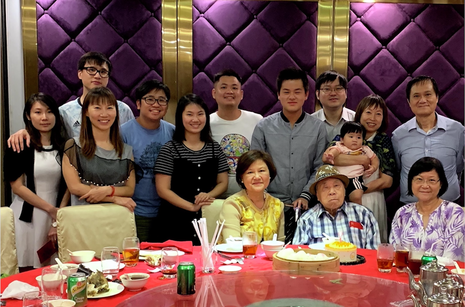Cooking and communicating into culture
Columnist Alexander Yao reflects on his heritage and roots

Growing up as a second-generation Chinese-Australian has provided me with experiences which have profoundly shaped me and my understanding of the world today. In previous articles, I’ve talked a lot about my Australian identity, but this time, I’d like to focus on my heritage and how greatly it has influenced me. As both my parents were born in Hong Kong, I used to visit the city twice a year before starting university, and I am so grateful for this upbringing which immersed me in the environment in which my family was raised. Not only did my attachment to Hong Kong allow me to properly connect with my roots, but it also exposed me to a fusion of cultures from the day I was born.
Australia itself is a particularly cosmopolitan country, and the multicultural nature of the society is all the more palpable in the state capitals such as Sydney, where I was born and raised. Given the country’s geographical proximity to Asia, almost every neighbourhood and suburb has a Thai, Vietnamese, Japanese, Korean, Chinese, Indian and Indonesian restaurant. It’s a beautiful mixing pot of cultures, and the average European Australian grows up surrounded by this diverse representation of ethnicities, traditions and customs.
It’s interesting to note that despite this multiplicity of cultures, I definitely noticed amongst other second-generation immigrants a tendency to want to ‘fit in’ and become more ‘Australian’, often neglecting their foreign heritage. As someone who has always been fascinated by the intersecting of cultural practices and beliefs, I found that this was such a shame, and rather ironic, given that the concept of being ‘Australian’ is so tenuous and if anything, defined precisely by the peaceful and harmonious coexistence of various backgrounds which enriches everyday life there.
“I definitely noticed amongst other second-generation immigrants a tendency to want to ‘fit in’ and become more ‘Australian’, often neglecting their foreign heritage”
Anyone who knows me knows that I am particularly passionate about two things: languages and food. These two areas have always represented routes for me to connect with my heritage, and by extension, other cultures. As someone who is fascinated by languages, people often ask me where this love came from and how it started. It took me a while to realise that I owe it to my bilingual upbringing, having spoken both English and Cantonese from the very beginning. Speaking Cantonese has enabled me to communicate with relatives and understand not only my personal, family history, but also Chinese traditions and values first-hand.
The importance of family, respect for elders and an appreciation of the work put into things around us, are only a few examples of the morals integral to Chinese culture, which have been passed down through generations of the family to me. I am so glad that I have been able to fully recognise the importance and also the origins of such values through my ability to engage in an exchange of ideas with older generations who do not speak English. The Chinese language itself is so rich and nuanced, with the characters and written script offering an insight into centuries of technological and societal development throughout numerous dynasties. Having already learnt Mandarin when I was younger, I’ve recently started to pick it up again, and this has not only given me the opportunity to access thousands of years of history which formed my identity and through which my ancestors lived, but it has also enabled me to communicate with those who share a similar heritage to me.
I also mentioned food, and this has been such a significant area of life which has been paramount to me in representing my cultural identity, especially since moving to the UK. Food can evoke so many emotions, and it has definitely made me feel at home at important times, such as during the Chinese New Year period earlier this year. For me, food has a particularly nostalgic quality, perhaps because it plays such a fundamental role especially in Chinese culture in joining people together and bringing together family and friends, both during festive seasons and also in general. Whether it be eating out at restaurants, or dining at home, meals in Chinese culture are a social event, and this was such an intrinsic part of my childhood and upbringing.
“[M]any of my cherished memories which I still treasure revolve around these experiences of sharing a meal, not only for the food, but more importantly for the company”
So many of my cherished memories which I still treasure revolve around these experiences of sharing a meal, not only for the food, but more importantly for the company. Even more so during this time away from home, one thing I definitely have missed is coming together around a large table and sharing endless dishes of delicious food, everyone going in for more, a rowdy table of chatter and conversations overlapping one another - plates, bowls and glasses ringing. I’ve found that for comfort food, I have increasingly turned towards dishes which remind me of these times with my parents and with family, and making my own Chinese food which I made with my parents when I was at home has been a powerful means of making me feel connected to home and my origins.
Cooking has always been a passion of mine, but even more so since coming to the UK, with food having been invaluable in evoking personal memories, especially in its ability to act as such a complete representation of each country’s unique culture. On top of this, sharing this experience and introducing friends here in the UK to these dishes which carry such great significance for me, has given me such an indescribable joy. With the sharing of food, I feel that I am sharing my culture and personal experiences, and this to me is extremely special.
For me, the dessert dish 湯圓 (Tang Yuan) perfectly joins the two aspects of language and food which are so crucial to my connection to my cultural roots. As is the case with many festive Chinese dishes, the words are homophones for another expression which the consumption of the dish symbolises – in this case, the words literally mean ‘soup round’ and are glutinous rice balls often filled with black sesame paste, eaten in a sweet soup. However, the words can also mean ‘togetherness of family’, a highly valued concept in Chinese culture, and one which I see as especially important in these times.
 News / Downing Bar dodges college takeover31 January 2026
News / Downing Bar dodges college takeover31 January 2026 Comment / College rivalry should not become college snobbery30 January 2026
Comment / College rivalry should not become college snobbery30 January 2026 Fashion / A guide to Cambridge’s second-hand scene2 February 2026
Fashion / A guide to Cambridge’s second-hand scene2 February 2026 Lifestyle / Which Cambridge eatery are you?1 February 2026
Lifestyle / Which Cambridge eatery are you?1 February 2026 News / Deborah Prentice overtaken as highest-paid Russell Group VC2 February 2026
News / Deborah Prentice overtaken as highest-paid Russell Group VC2 February 2026









